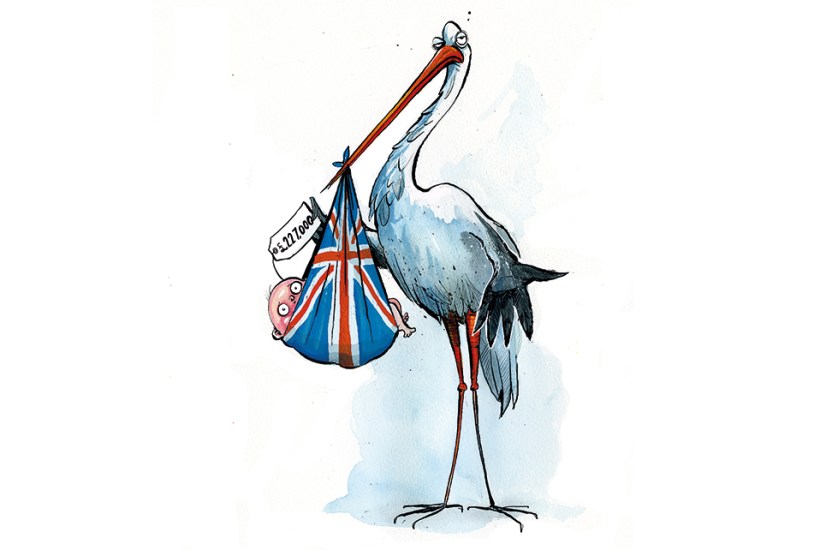I am delighted to report that some £800,000 of taxpayers’ money is to be spent ‘remediating’ the works of Robert Louis Stevenson to show what a racist bastard he was.
70 per cent of Irish mums say they would stay at home to look after their kids if given the opportunity
I assume the decision was taken because, as a nation, we are absolutely awash with cash at the moment and need somewhere to dispense of it. This project, funded by the quango UK Research and Innovation (UKRI), will be carried out at Edinburgh University. I hope that, aside from clobbering Stevenson for having been born during a different time period, they also have a go at him for his stereotypical portrayal of the disabled – and indeed pirates. Ever since reading Treasure Island I have viewed one-legged people with grave suspicion and will not voluntarily engage them in conversation. If they try to speak to me, I mumble something unintelligible and quickly walk away, immediately checking my pockets to see if my wallet has been stolen. I cannot abide them, you see – and this is primarily the fault of Stevenson and his odious creation Long John Silver. I have been told that not all amputees are violent criminals, even if they have parrots on their shoulders, but it has done me no good. I still fear and loathe them, much as I do blind people – again, a result of having been introduced to the appalling Pew.
I also hope UKRI manages to find people to carry out this important and expensive bit of smearing. It may well be that they will have to rely upon imported Chadians, or Mauritanians, given that according to the Lancet nobody in Britain is having babies any more and soon we will have to import our workforce from sub-Saharan Africa, where they are having more babies than anyone else, anywhere. The Lancet study suggested that 155 countries in the world do not have high enough fertility rates for their economies to continue functioning without the importing of labour from the likes of Mali, Chad, Niger, Mauritania and Sudan. Meanwhile, those incoming would change the culture of their adopted countries – which might cause a certain frisson of resentment here and there.
It was a peculiar piece of academic research, given that we have known for decades that our fertility rates have been dropping and that the countries of sub-Saharan Africa – by and large the most violent, worst-run and poorest in the world – have populations who spend almost their entire time on the job, so to speak. It does not remotely follow, though, that they would be the answer to our labour crisis.
It is doubtful, for example, that a sufficient number would have anything like the educational achievements or abilities to do the jobs we want them to do. The authors of the study rather bought into the fallacy – which all liberals have done – that everybody in the world is basically the same, with identical abilities and potential. This is some considerable distance from the truth. If we were talking about Nigerians, rather than Nigeriens, the proposed solution might make sense. Or indeed people from Ghana and other former British colonies. The Ghanaians and Nigerians have brought to us not only hard work, skills and entrepreneurial spirit, but also a respect for education, British culture, the family and the Christian faith which has made them – along with the Ugandan and Kenyan Asians – exemplary immigrants, arguably more British than the British. I am not wholly convinced that exactly the same might be said of the people from Sudan or Niger. I’m sure they have many wonderful skill sets, but an amicable and pacific culture and a resolute faith in Our Lord Jesus Christ are not obviously among them.
The Lancet study made front-page headlines, one newspaper describing it all as a ‘terrifying’ scenario. It was rather as if we had suddenly found out that we’re not having babies any more and that this might have one or two ramifications further down the line. Remarkable, no? Here’s the thing. If you spend 50 years inculcating in women the notion that being a ‘stay-at-home mum’ (or a ‘mum’, as we used to call it) is rather de trop, and that women are not only letting the side down but also denying themselves a chance to ‘live their best lives’ (as the obnoxious current phrase has it) if they don’t eschew childbirth and instead go out to work, then what the hell do you expect will be the consequence a generation or so later?
We have done everything we can to herd women into the labour force, even to the point of assuring them, wrongly, that they can have it all by juggling a career with bringing up baby. My argument here isn’t that women shouldn’t go out to work, simply that for every bit of progressive social engineering we undertake there is always – always – an unforeseen ramification which nobody much thought about at the time. Progressive social engineering adopts a Year Zero approach and has scant regard for realities. Women are finding out now that attempting to hold down a job while rearing kids is anything but a best of both worlds and is more usually a worst of both. This causes untold agonies.
All we need to do is stop denigrating the full-time mum and allow women a free choice, with a level playing field, as to what they want to do. A recent survey in Ireland showed that 69 per cent of mums would stay at home to look after their kids if given the opportunity. Sheesh, it’s almost as if there’s some kind of weird biological thing going on.
What to do? The SDP’s policy is for a single income to be wholly tax-free for a married couple with children, allowing the parents to decide who should go to work. Other countries, such as Hungary, have gone further. If we wish to avoid handing out hundreds of thousands of British passports in Khartoum and Niamey, I suggest we make sure the traditional British family gets the tax breaks to rear its children.<//>
Got something to add? Join the discussion and comment below.
Get 10 issues for just $10
Subscribe to The Spectator Australia today for the next 10 magazine issues, plus full online access, for just $10.
You might disagree with half of it, but you’ll enjoy reading all of it. Try your first month for free, then just $2 a week for the remainder of your first year.















Comments
Don't miss out
Join the conversation with other Spectator Australia readers. Subscribe to leave a comment.
SUBSCRIBEAlready a subscriber? Log in